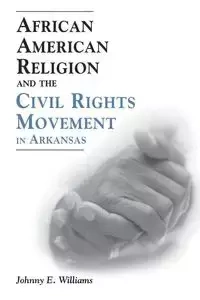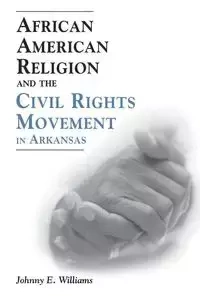African American Religion and the Civil Rights Movement in Arkansas - E. Williams Johnny
African American Religion and the Civil Rights Movement in Arkansas - E. Williams Johnny
AutorzyE. Williams Johnny
EAN: 9781604731866
Symbol
770FGI03527KS
Rok wydania
2003
Elementy
204
Oprawa
Miekka
Format
15.2x22.9cm
Język
angielski

Bez ryzyka
14 dni na łatwy zwrot

Szeroki asortyment
ponad milion pozycji

Niskie ceny i rabaty
nawet do 50% każdego dnia
Niepotwierdzona zakupem
Ocena: /5
Symbol
770FGI03527KS
Kod producenta
9781604731866
Autorzy
E. Williams Johnny
Rok wydania
2003
Elementy
204
Oprawa
Miekka
Format
15.2x22.9cm
Język
angielski

What role did religion play in sparking the call for civil rights? Was the African American church a motivating force or a calming eddy? The conventional view among scholars of the period is that religion as a source for social activism was marginal, conservative, or pacifying. Not so, argues Johnny E. Williams. Focusing on the state of Arkansas as typical in the role of ecclesiastical activism, his book argues that black religion from the period of slavery through the era of segregation provided theological resources that motivated and sustained preachers and parishioners battling racial oppression.
Both religious beliefs and the African American church itself were essential in motivating blacks to act individually and collectively to confront their oppressors in Arkansas and throughout the South. Drawing on interviews, speeches, case studies, literature, sociological surveys, and other sources, Williams explains how the ideology of the black church roused disparate individuals into a community and how the church established a base for many diverse participants in the civil rights movement.
He shows how church life and ecumenical education helped to sustain the protest of people with few resources and little permanent power. Williams argues that the church helped galvanize political action by bringing people together and creating social bonds even when societal conditions made action difficult and often dangerous. The church supplied its members with meanings, beliefs, relationships, and practices that served as resources to create a religious protest message of hope.
Johnny E. Williams is associate professor of sociology at Trinity College.
EAN: 9781604731866
EAN: 9781604731866
Niepotwierdzona zakupem
Ocena: /5
Zapytaj o produkt
Niepotwierdzona zakupem
Ocena: /5
Napisz swoją opinię

